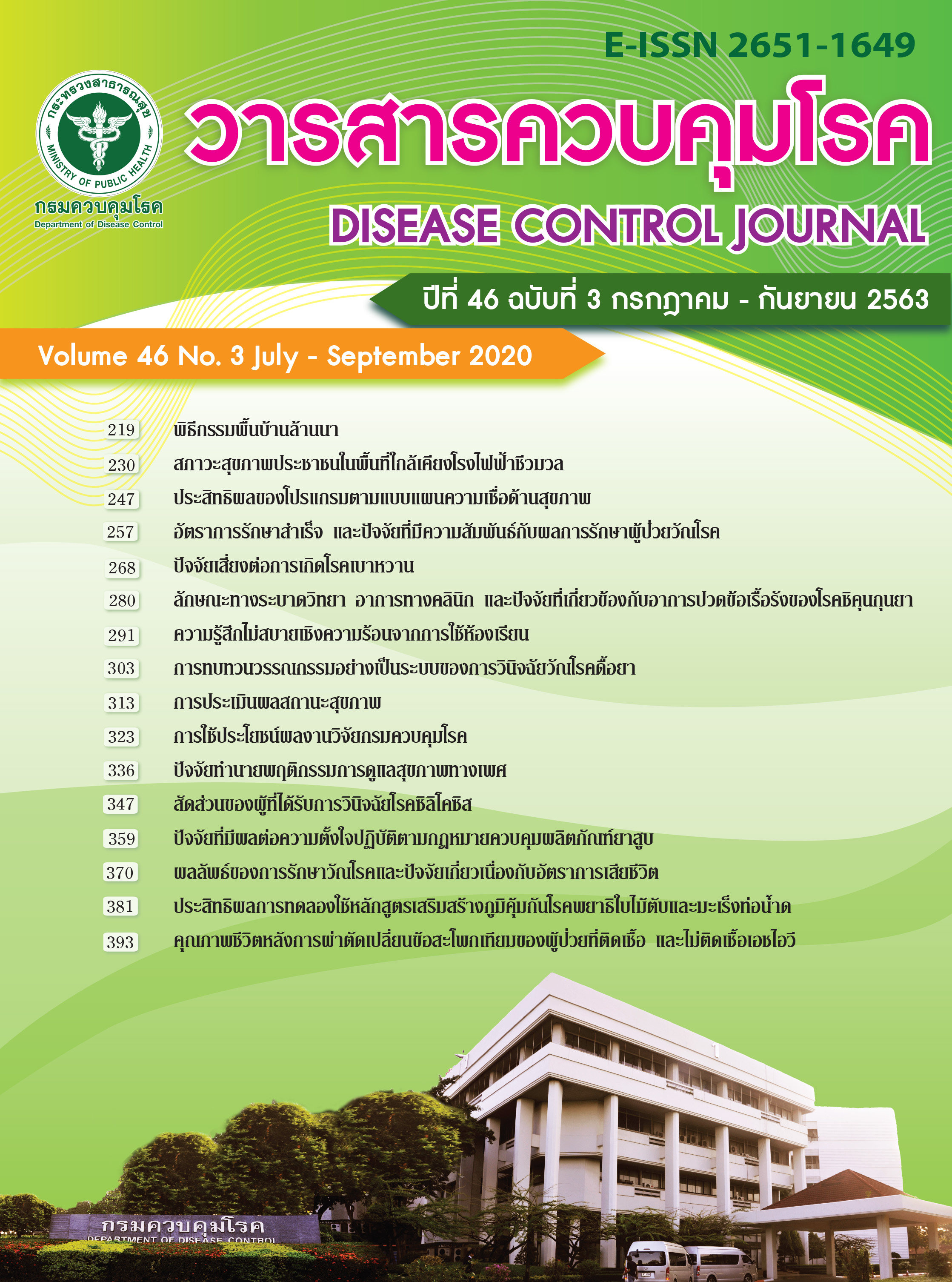Factors Affecting Compliance Factors affecting compliance intention on tobacco products control act among tobacco retailers around schools of Health Regional 5th in Thailand
DOI:
https://doi.org/10.14456/dcj.2020.34Keywords:
intention of compliance with tobacco products control act, tobacco retailers, theory of planned behavior (TPB)Abstract
The cross - sectional survey research aimed to describe the intention and factors affecting intention to comply with Tobacco Products Control Act B.E. 2560 (2017) of tobacco retailers at grocery stores located around schools who were ever not complied with the law. The theory of Planned Behavior (TPB) was applies as a research framework. The samples 127 tobacco retailers at grocery stores located around government high schools within a radius of 1,000 meter in the 5th Regional Health and ever not complied with the law at least 1 article within a year. Data were collected by interview questionnaires. Descriptive statistics and inferential statistics were used to analyze data. The results revealed that 51.2% of the respondents had moderate intention to comply with the law. Seven factors were significantly related to intention to comply with the law with statistical significance (p< 0.05). Three of 7 factors are negative factors composing of number of opening hours of tobacco stores each day, number of non - compliance with the law, and subjective norm which is of government organization. The rest 4 factors are positive factors composing of the perception of the law, the attitudes to comply with the law, perceived behavioral control towards compliance with the law, and received advices or supporting items from dealers of the cigarette companies. Based on the results, 3 factors could statistically predict intention to comply with the law up to 73.6% (Nagelkerke R2 = 0.736) composing of perception of the law, perceived behavioral control and attitude towards compliance with the law. The recommendations are to strengthen the engagement activities for tobacco retailers to comply with the law, particularly those at grocery stores who had experienced on non - compliance with the law, and to provide incentives by various approaches to those who comply with the law.
Downloads
References
World Health Organization. WHO report on the global tobacco epidemic, 2019 Offer help to quit tobacco use. Luxembourg: World Health Organization; 2019.
Goodchild M, Nargis N, d’Espaignet ET. Global economic cost of smoking-attributable diseases. Tobac Contr 2018; 27: 58–64.
National Statistical Office. The Smoking and Drinking Behaviour Survey 2014. Bangkok: National Statistical Office; 2014. (in Thai)
National Statistical Office. The Smoking and Drinking Behaviour Survey 2017. Bangkok: National Statistical Office; 2018. (in Thai)
Usaha J, Luemchan D, Gunvihok T. Evaluation on the National Strategic Plan for Tobacco Control 2012 – 2014. Disease Control Journal 2012;42:151–61. (in Thai)
National Statistical Office. The Smoking and Drinking Behaviour Survey 2011. Bangkok: National Statistical Office; 2011. (in Thai)
Chotbenjamaporn P, Anuntawong N. Law Enforcement of Tobacco and Alcohol Control Acts in peri - Bangkok Metropolitan area in 2010 - 2011. Disease Control Journal 2012;33:167–176. (in Thai)
Law Division. Tobacco Product Control Act B.E.2560. Bangkok: Chulalongkorn University; 2017. (in Thai)
Bureau of Tobacco Control. Smoke Free School in 2018 [Internet]. Nonthaburi. Bureau of Tobacco Control; 2018 [cited 2017 July 22]. 20 p. Available from: http://btc.ddc.moph.
go.th/th/smokefree.php?type=1. (in Thai)
McCarthy WJ, Mistry R, Lu Y, Patel M, Zheng H, Dietsch B. Density of tobacco retailers near schools: effects on tobacco use among students. Am J Publ Health 2009;99:2006 –13.
Chan WC, Leatherdale ST. Tobacco retailer density surrounding schools and youth smoking behaviour: a multi-level analysis. Tobacco Induced Disease 2011;9:1–7
Leatherdale ST, Strath JM. Tobacco retailer density surrounding schools and cigarette access behaviors among underage smoking students. Ann Behav Med 2007;33:105–111.
Ajzen I. From intention to actions: A theory of planned behaviour. In: J. Kuhl & J. Beckmann, editors. Action - control: From cognition to behavior. Heildelgerg: Springer; 1985. p. 11–39.
Bloom BS, Hasting JT, Madaus GF. Handbook on Formative and Summative Evaluation of Student Learning. New York: McGraw-Hill Book Co; 1971.
Khumthong A. Factors Predicting Intention in Prevention and Control of Avian Influenza of Village Health Volunteers [dissertation]. Chiang Mai: Chiang Mai University; 2007. 125 p. (in Thai)
Apitantiti P. Relationships among Attitude, Subjective Norm, Perceived Behavioral Control, Intention and Service Behavior (CARE) of Employees in Non – Life Insurance Company [dissertation]. Pathum Thani: Thammasat University; 2008. 133 p. (in Thai)
Srisakul S. Factors Predicting Intention for Cervical Cancer Screening among Women Aged 30 to 60 Years in Ratchaburi Province [dissertation]. Pathum Thani: Thammasat University; 2011. 85 p. (in Thai)
Norman P, et al. The Theory of Planned Behaviour and exercise: Evidence for the moderating role of past behaviour. Br J Health Psycho 2000;5:249–261.
Boudreau F, Godin G. Using the Theory of Planned Behaviour to predict exercise intention in obese adults. CJNR 2007;39:112–124.
Sujitchawalakul A, Chomson S, Sinsuesatkul S. The Factors Influencing the Intention of Smoking Behaviors Amongst Female Junior High School Students. Christian University of Thailand Journal 2011;17:42–50. (in Thai)
Tiamtoy P. Implementation Effectiveness of Tobacco Advertisement and Sales Promotion at The Point of Sale in Retail Stores According to The Tobacco Product Control ACT 2535 B.E. in Bangkok [dissertation]. Bangkok: Mahidol University; 2013. 152 p. (in Thai)
Phetphum C, Noosorn N, Nimpitakpong P, Mekrungrongwong S. A Community of Practices (COPs) Approach for Rural Retailer Behavioral Change Concerning Tobacco Sale to Minor. Journal of Nursing and Health Sciences 2015;9:147–161. (in Thai)
Phetphum C, Noosorn N, Wangwonsin A, Pongpreecha B. Retailer Factors Related to Tobacco Sale to Minors in Health Region 2. Journal of Health Systems Research 2018;12:56–70. (in Thai)
Chiu YL, Chiu YC, Chang YW, Chu CM, Lin FG, Lai CH, et al. Using an extended theory of planned behaviour to predict smoking cessation counsellors’ intentions to offer smoking cessation support in the Taiwanese military: a cross-sectional study. BMJ Open 2019;9:1–7.
Downloads
Published
How to Cite
Issue
Section
License
Articles published in the Disease Control Journal are considered as academic work, research or analysis of the personal opinion of the authors, not the opinion of the Thailand Department of Disease Control or editorial team. The authors must be responsible for their articles.






